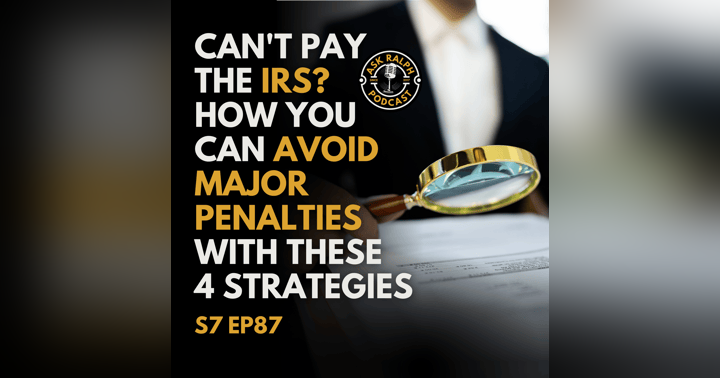What Are the Warning Signs of a Debt Collection Scam?

What Are the Top 7 Debt Collection Scams to Avoid?
Dealing with debt collectors can be stressful enough, but when scammers enter the picture, the situation becomes even more dangerous. In this episode of The Ask Ralph Podcast, Ralph Estep Jr. outlines the top 7 debt collection scams you need to be aware of to protect yourself and your finances. Drawing from real-life stories, Ralph offers practical advice on how to spot fraudulent tactics and what steps to take if you're targeted by a scammer. If you’ve ever received suspicious calls demanding immediate payments or threatening legal action, this episode is packed with essential tips to help you stay safe and Warning Collection Scam.
Watch Here on Rumble
https://www.askralphpodcast.com/debt-collections-scams/
Introduction: Protecting Yourself from Debt Collection Scams
Ralph opens the episode by addressing a growing concern: the increasing number of debt collection scams. He emphasizes that anyone can be targeted, and it’s crucial to be informed to avoid falling into the trap. By highlighting real-life stories, Ralph provides listeners with a detailed guide to recognizing scams, preventing financial loss, and protecting their hard-earned money.
Listener Question: Charlie's Debt Collection Dilemma
A listener named Charlie shares a personal experience, describing aggressive phone calls from people claiming to be debt collectors. Charlie is unsure how to tell if these calls are legitimate or scams. Ralph explains that this is a common issue and shares practical advice on how to verify a debt before taking any action. His key message? Always ask for written validation and never give personal information over the phone to unverified callers.
Real-Life Story: Sally’s $10,000 Scam
Ralph shares the story of Sally, a single mother of two who was scammed out of $10,000 by someone pretending to be a debt collector. The scammer pressured her into purchasing gift cards as payment, leaving her devastated. Sally’s experience serves as a stark reminder of how easily anyone can become a victim, and Ralph uses this as a case study to help others avoid similar situations.
The Top 7 Debt Collection Scams to Watch Out For
Ralph breaks down the seven most common debt collection scams, helping listeners understand what to look out for:
- The Phantom Debt Scam – Scammers claim you owe a debt that doesn’t exist.
- Immediate Payment Demand – Legitimate collectors must send written validation, so avoid paying without this.
- The Threat of Arrest – Debt collectors cannot have you arrested, and threats like these are red flags.
- Odd Payment Methods – Requests for payment via gift cards or cryptocurrency are common in scams.
- Identity Theft Setup – Scammers often try to gather personal information like your Social Security number.
- Robocall Debt Collection – Automated calls claiming you owe money are illegal and often fraudulent.
- Fake Government Agencies – Some scammers pretend to be from government agencies, like the IRS, to gain credibility.
Michael’s Story: Avoiding the Robocall Trap
Ralph shares another listener story, this time about Michael, who was targeted by robocallers claiming he owed a debt. Luckily, Michael contacted the original creditor directly and avoided falling victim to the scam. This story illustrates the importance of verifying debts before acting.
Action Steps for Avoiding Debt Collection Scams
To wrap up the episode, Ralph outlines seven proactive steps you can take to protect yourself:
- Always ask for written validation of any debt.
- Never give out personal information over the phone.
- Contact the original creditor directly if you’re unsure.
- Avoid paying via gift cards or cryptocurrency.
- Hang up if someone threatens you with arrest.
- Register your number with the National Do Not Call Registry.
- Report scams to the Federal Trade Commission (FTC) and your state’s Attorney General.
Conclusion: Be Informed, Be Protected
Ralph closes the episode with a reminder that knowledge is your best defense against debt collection scams. By staying informed and following these tips, you can safeguard your finances and avoid becoming a victim.
What is your question that you would like to ask Ralph? Send Your Question here: https://justaskralph.com/
Join our email list and get a free copy of “Mastering Your Finances” at https://askralph.com/
Schedule Appointment with Saggio Management Group, Inc. https://app.acuityscheduling.com/schedule/fabfb9f2/appointment/8258839/calendar/2141336?appointmentTypeIds[]=8258839












